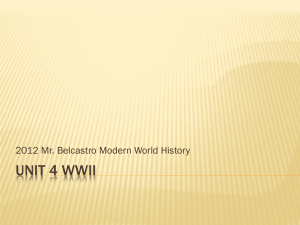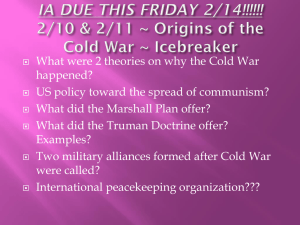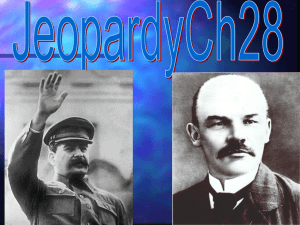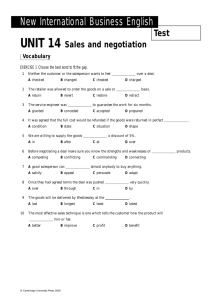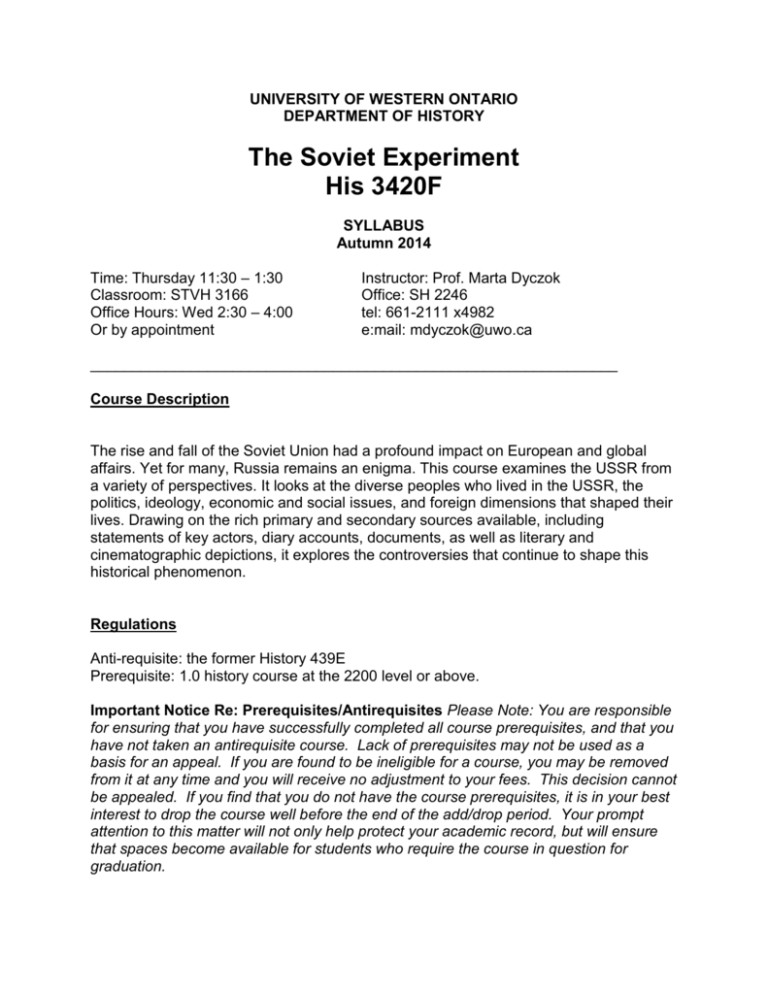
UNIVERSITY OF WESTERN ONTARIO
DEPARTMENT OF HISTORY
The Soviet Experiment
His 3420F
SYLLABUS
Autumn 2014
Time: Thursday 11:30 – 1:30
Classroom: STVH 3166
Office Hours: Wed 2:30 – 4:00
Or by appointment
Instructor: Prof. Marta Dyczok
Office: SH 2246
tel: 661-2111 x4982
e:mail: mdyczok@uwo.ca
_______________________________________________________________
Course Description
The rise and fall of the Soviet Union had a profound impact on European and global
affairs. Yet for many, Russia remains an enigma. This course examines the USSR from
a variety of perspectives. It looks at the diverse peoples who lived in the USSR, the
politics, ideology, economic and social issues, and foreign dimensions that shaped their
lives. Drawing on the rich primary and secondary sources available, including
statements of key actors, diary accounts, documents, as well as literary and
cinematographic depictions, it explores the controversies that continue to shape this
historical phenomenon.
Regulations
Anti-requisite: the former History 439E
Prerequisite: 1.0 history course at the 2200 level or above.
Important Notice Re: Prerequisites/Antirequisites Please Note: You are responsible
for ensuring that you have successfully completed all course prerequisites, and that you
have not taken an antirequisite course. Lack of prerequisites may not be used as a
basis for an appeal. If you are found to be ineligible for a course, you may be removed
from it at any time and you will receive no adjustment to your fees. This decision cannot
be appealed. If you find that you do not have the course prerequisites, it is in your best
interest to drop the course well before the end of the add/drop period. Your prompt
attention to this matter will not only help protect your academic record, but will ensure
that spaces become available for students who require the course in question for
graduation.
Plagiarism and Cheating
Plagiarism and cheating are considered extremely serious academic offences and carry
penalties varying from failure in an assignment of exam to debarment from the
University. All His 3420F students are expected to familiarise themselves with the
definitions of plagiarism and cheating as established in University of Western Ontario
before submitting written work or entering the exam (see Scholastic Offence Policy in
the Western Academic Calendar). Students must write their essays and assignments in
their own words. Whenever students take an idea, or a passage from another author,
they must acknowledge their debt both by using quotation marks where appropriate and
by proper referencing such as footnotes or citations. Plagiarism Checking: The
University of Western Ontario uses software for plagiarism checking. Students may be
required to submit their written work in electronic form for plagiarism checking.
Course Requirements
This course is conducted in seminar format. Students are expected to attend all classes
and participate in the discussion based on the weekly readings. Once during the
semester each student will be asked to make a seminar presentation and lead the class
in discussion. The presentations should not be summaries of the week’s readings or
book reports. Rather they ought to bring out the main points, issues and problems of
each subject and wherever possible, should be linked to other weeks’ themes and
readings. Oral presentations should be no more than 30 minutes in length. Students will
be asked to write one book review due in week 4, and one analytical essay, 4,000 4,500 words in length, due in class on week 11. A brief topic proposal for the research
paper (including some indication of sources) should be submitted by week 6. A film will
be screened during the course, attendance is mandatory.
Grades
Grades will be assigned according to the following breakdown:
Assignment
Grade
Due Date
seminar
book review
class participation
essay
20%
10%
20%
25%
Take Home examination
25%
selected topic
week 4: 25 September 2014
weekly
proposal due week 6: 9 October 2014
essay due week 11: 13 November 2014
December 2014
Readings
Required:
Kenez, Peter. A history of the Soviet Union from the beginning to the end 2nd ed.
(Cambridge; New York: Cambridge University Press, 2006)
Remnick, David, Lenin’s Tomb: The Last Days of the Soviet Empire (Random House,
paperback, 1993, 1994)
His 3420F Course Packet of Primary Documents (2014)
Required readings will be available electronically and on reserve at Weldon Library. A
course packet of primary sources will be prepared and will be available for purchase at
the bookstore. Additional readings may be suggested during the course.
Primary Sources:
Acton, Edward and Tom Stableford (eds.) The Soviet Union. A Documentary History
(Exeter: University of Exeter Press, 2007)
Carynnyk, Marco et al (eds.) The Foreign Office and the Famine (Kingston: Limestone,
1988)
Fitzpatrick, Shiela, (ed.) Stalinism. New Directions (London and New York: Routledge,
2000)
Havel, Vaclav, The Power of the Powerless: Citizens Against the State in East Central
Europe (Cambridge: Granta in Association with Penguin, 1989)
Hogan, Ed (ed.) From three worlds: new Ukrainian writing (Zephyr Press, 1996)
Kollontai, Alexandra Selected writings of Alexandra Kollontai (translated [from the
Russian] with an introduction and commentaries by Alix Holt) (London: Allison
and Busby, 1977)
Luckyj, George S. N., (ed.) Modern Ukrainian Short Stories Rev. ed. (Englewood, Colo:
Ukrainian Academic Press, 1995)
Sakwa, Richard, The Rise and Fall of the Soviet Union 1917-1991 (London and New
York: Routledge, 1999)
Stokes, Gale, From Stalinism to Pluralism. A Documentary History of Eastern Europe
Since 1945. 2nd ed. (New York: Oxford University Press, 1996)
Suny, Ronald Grigor, The Structure of Soviet History. Essays and Documents (New
York: Cambridge University Press, 2003)
Tucker, Robert C., (ed.) The Lenin Anthology (New York: W. W. Norton, 1975)
Recommended:
Alexeyeva, Ludmilla and Paul Goldberg, The Thaw Generation: Coming of Age in the
Post-Stalin Era (University of Pittsburgh Press, paperback, 1990, 1993)
Daniels, Robert V. The Rise and Fall of Communism in Russia (Yale, 2007)
Kuromiya, Hiroaki. Stalin (Harlow, England; New York: Pearson/Longman, 2005)
Hosking, Geoffrey. The first socialist society: a history of the Soviet Union from within
(Cambridge. MA: Harvard University Press, 1993)
Malia, Martin E. The Soviet tragedy: a history of socialism in Russia, 1917-1991 (New
York: Free Press; Toronto: Maxwell Macmillan Canada; New York: Maxwell
Macmillan International, 1994)
McCauley, Martin, The Soviet Union 1917-1991. 2nd ed (London and New York:
Longman, 1993)
Service, Robert, Comrades! A History of World Communism (Cambridge: Cambridge
University Press, 2007)
Simon, Gerhard. Nationalism and Policy Towards the Nationalities in the Soviet Union.
From Totalitarian Dictatorship to Post-Stalinist Society Translated by Karen Forster
and Oswald Forster. (Boulder, San Francisco, Oxford: Westview Press, 1991)
Suny, Ronald Grigor, Revenge of the Past. Nationalism, Revolution and the Collapse of
the Soviet Union (Stanford: Stanford University Press, 1993)
Suny, Ronald G. The Soviet Experiment (Oxford University Press, paperback, 1998)
Suny, Ronald Grigor (ed.) The Cambridge History of Russia. Vol. 3. The Twentieth
Century (Cambridge: Cambridge University Press, 2006)
Suny, Ronald Grigor, The Structure of Soviet History. Essays and Documents (New
York: Cambridge University Press, 2003)
Sheila Fitzpatrick and Yuri Slezkine, eds., In the Shadow of the Revolution: Life Stories
of Russian Women: From 1917 to the Second World War (Princeton University
Press, paperback, 2000)
Selected Journals
Canadian Slavonic Papers
Central Asian Survey
Communist and Post-Communist Studies (formerly Studies in Comparative Communism)
Communist Economies and Economic Transformation
Demokratizatsiia
East European Constitutional Review
East European Politics and Societies
Europe-Asia Studies (formerly Soviet Studies)
Journal of Communist Studies
Journal of Democracy
Nationalities Papers
Post-Soviet Affairs (formerly Soviet Economy)
Problems of Post-Communism
Russian History
Russian Review
Slavic Review
Selected Electronic Resources
The American Association for the Advancement of Slavic Studies (AAASS)
http://www.fas.harvard.edu/~aaass/
Centre for Russian and East European Studies, University of Birmingham,
http://www.crees.bham.ac.uk/
Russian and East European Studies, University of Oxford,
http://www.rees.ox.ac.uk/
Center for Russian, East European and Eurasian Studies at Stanford University
http://creees.stanford.edu/
Center for Eurasian, Russian and East European Studies (CERES) at Georgetown
University
http://ceres.georgetown.edu/
Herbert J. Ellison Center for Russian, East European and Central Asian Studies,
University of Washington
http://jsis.washington.edu/ellison/
Russian and East European Studies, Yale University
http://www.yale.edu/yalecollege/publications/ycps/chapter_iv/russian.html
The Centre for European, Russian, and Eurasian Studies (CERES) at the University of
Toronto
http://www.utoronto.ca/ceres/
Russian, Eurasian & East European Studies, Columbia University,
http://www.columbia.edu/cu/lweb/indiv/slavic/index.html
University of Pittsburg Russian and East European Studies
http://www.ucis.pitt.edu/crees/
RFE/RL NEWSLINE. A daily report of developments in Eastern and Southeastern
Europe, Russia, the Caucasus and Central Asia prepared by the staff of Radio Free
Europe/Radio Liberty.
Web-site: http://www.rferl.org/newsline/search/
Institute for the Study of Conflict, Ideology and Policy, Boston University
http://www.bu.edu/iscip/index.html
Johnson’s Russia List - provides twice daily transmissions of articles on Russia from the
press worldwide. To subscribe send a message to davidjohnson@erols.com informing
him that you are a student and would like to subscribe free of charge
The CDI Russia Weekly an e-mail newsletter that carries news and analysis on all
aspects of today's Russia. With funding from the Carnegie Corporation of New York,
CDI Russia Weekly is a project of the Washington-based Center for Defense
Information (CDI), a nonprofit research and education organization.
Central Europe Review. A weekly on-line journal of Central and East European politics,
society and culture.
http://www.ce-review.org/_about.html
bibliography compiled by Andrea Graziosi
www.fas.harvard.edu/~hpcws/biblioguide.htm
Week 1. Introduction to the Study of Soviet History
(4 September 2014)
Secondary Sources
Carr, E. H., What Is History? 2nd. ed. (Basingstoke: Macmillan, 1986) Chapter 1
Kenez, Peter. A history of the Soviet Union from the beginning to the end 2nd ed.
(Cambridge; New York: Cambridge University Press, 2006), Chapter 1
Motyl, Alexander J. "Sovietology in One Country or Comparative Nationality Studies?" in
Slavic Review Vol. 48, No. 1 (Spring 1989)
Remnick, David. Lenin's Tomb. The Last Days of the Soviet Empire (New York:
Random House, 1993), Chapter 1
Primary Sources
See discussion in Slavic Review, April 1993
Week 2. The Russian Empire on the Eve of Revolution and the 1917 Revolutions
(11 September 2014)
Secondary Sources
Smith, S. A., “The Revolutions of 1917-1918,” in Ronald Grigor Suny, (ed.) The
Cambridge History of Russia. Vol. 3. The Twentieth Century (Cambridge: Cambridge
University Press, 2006), Chapter 4.
Kenez, Peter. A history of the Soviet Union from the beginning to the end 2nd ed.
(Cambridge; New York: Cambridge University Press, 2006), Chapter 2.
Primary Sources
“The Emergence of Bolshevism,” “Early Critics of Lenin,” “1905 and Beyond,” “The
Intelligentsia and Revolution,” in Richard Sakwa, The Rise and Fall of the Soviet
Union 1917-1991 (London and New York: Routledge, 1999):
pp. 5-22
Lenin, V. I., “What Is To Be Done?” (excerpt) in Sakwa, pp. 6-8, full text in Robert C.
Tucker, (ed.) The Lenin Anthology (New York: W. W. Norton, 1975), pp. 12 – 114)
Lenin, V. I., “One Step Forward, Two Steps Backwards,” (excerpt) in Sakwa, pp. 8-9
Lenin, V. I., “On Democratic Centralism,” in Sakwa, pp. 16-17
Lenin, V. I., “On Party Mindedness,” in Sakwa, pp. 135-16
Luxemburg, Rosa, “Leninism or Marxism?” in Sakwa, pp. 10-11
“Order No. 1,” in Ronald Grigor Suny, The Structure of Soviet History. Essays and
Documents (New York: Cambridge University Press, 2003) pp. 32-35
Trotsky, Leon, “Our Political Tasks,” in Sakwa, pp. 11-12
Trotsky, Leon, “Permanent Revolution,” in Sakwa, pp. 14-15
Tsereteli at the First Congress of Soviets, in Sakwa, pp. 38-39
Week 3. Library Instruction Session
(18 September 2014)
Please meet at the Reference Desk of Weldon Library
Week 4. Civil War and War Communism
(25 September 2014)
BOOK REVIEW DUE IN CLASS
Secondary Sources
Evtukhov, Catherine, David Goldfrank, Lindsey Hughes and Richard Stites, A History of
Russia: Peoples, Legends, Events, Forces (Boston and New York: Houghton Mifflin
Company: 2004), Chapter 31
Malia, Martin E. The Soviet tragedy: a history of socialism in Russia, 1917-1991 (New
York: Free Press; Toronto: Maxwell Macmillan Canada; New York: Maxwell
Macmillan International, 1994), Chapters 3 and 4.
Primary Sources
“Dissolution of the Constituent Assembly,” in Suny, pp. 67-73
Establishment of the Secret Police, in Sakwa, pp. 74-75
Trotsky and the Red Army, in Sakwa, p. 81
Kautsky on the Russian Revolution, in Sakwa, pp. 91-94
Khvylovy, Mykola, "My Being," in George S. N. Luckyj (ed.) Modern Ukrainian Short
Stories Rev. ed. (Englewood, Colo: Ukrainian Academic Press, 1995)
Week 5. The Non-Russians
(2 October 2014)
Secondary Sources
Suny, Ronald G. The Soviet Experiment (Oxford University Press, paperback, 1998),
Chapter 4
Martin, Terry, “An Affirmative Action Empire: The Soviet Union as the Highest Form of
Imperialism,” in Ronald Grigor Suny and Terry Martin (eds.), A State of Nations.
Empire and Nation – Making in the Age of Lenin and Stalin (Oxford: Oxford
University Press, 2001), Part I, p. 67
Smith, Jeremy, “The Non-Russians in the Soviet Union and After,” in Ronald Grigor
Suny, (ed.) The Cambridge History of Russia. Vol. 3. The Twentieth Century
(Cambridge: Cambridge University Press, 2006), Chapter 18
Primary Sources
Lenin, V. I., "Communism and the East: Theses on the National and Colonial
Questions;" "Against Great Russian Chauvinism," in Tucker, pp. 619-625
Lenin, V. I., "Against Great Russian Chauvinism," in Tucker, pp. 659-660
“Nationalism, Imperialism and the Great War,” in Sakwa, pp. 23-31
Week 6. The Crisis of War Communism and NEP
(9 October 2014)
ESSAY PROPOSAL DUE IN CLASS
Secondary Sources
Ball, Alan, “Building a New State and Society: NEP 1921-1928,” in in Ronald Grigor
Suny, (ed.) The Cambridge History of Russia. Vol. 3. The Twentieth Century
(Cambridge: Cambridge University Press, 2006), Chapter 6.
Kenez, Peter. A history of the Soviet Union from the beginning to the end 2nd ed.
(Cambridge; New York: Cambridge University Press, 2006), Chapter 3.
Primary Sources
Lenin, "Communism and the New Economic Policy," in Tucker, pp. 518-533
“On the Replacement of Requisitioning by a Tax in Kind,” Lenin on the “Tax in Kind,”
“Lenin puts NEP in Perspective,” in Sakwa, pp. 127-131
Lenin, V. I., “Letter to the Congress, 23-31 December 1922,” (Lenin’s Testament), in
Suny, pp. 118-123 (Not in course reader)
Week 7. Revolution from Above
(16 October 2014)
Secondary Sources
Kuromiya, Hiroaki. Stalin (Harlow, England; New York: Pearson/Longman, 2005),
Chapter 3, Battle Royale, pp. 58-73, Chapter 4, Revolution from Above
Malia, Martin, “The Soviet Tragedy: A History of Socialism in Russia. The Stalin
Question,” in Hoffmann, David L. (ed.) Stalinism: the essential readings (Malden,
MA: Blackwell, 2003)
Kenez, Peter. A history of the Soviet Union from the beginning to the end 2nd ed.
(Cambridge; New York: Cambridge University Press, 2006), Chapter 4.
Suny, Ronald Grigor, The Structure of Soviet History. Essays and Documents (New
York: Cambridge University Press, 2003), pp. 151-164 (not in course reader)
Primary Sources
Stalin, “On Leninism, the Party and Dictatorship,” in Sakwa, pp, 164-166
Correspondence between Kamenev and Bukharin, 11 July 1928, Voroshilov and
Orjonikidze 8 Jun 1929, Stalin to V and O on 30 Sept 1929, in Suny, pp. 137-141
Stalin, “On the Tasks of Workers in the Economy,” 4 Feb 1931, in Suny, pp. 294-295
(not in course reader)
Week 8. FILM: Harvest of Despair (1985, Canada)
(23 October 2014)
This film documents the Ukrainian terror famine of 1932--33, which caused the deaths
of 7,000,000 people. Using interviews with survivors and scholars to supplement rare
photographic evidence, it established that the terror famine was deliberately created by
the Soviet Government as part of Stalin's decades-long effort to destroy the Ukrainian
peasantry, who resisted the forced collectivization of their lands. Since its original
release, it has received many international awards (including an Academy Award
nomination) and has been featured on William F. Buckley's Firing Line program on the
PBS television network. A powerful film, Harvest of Despair provides rare insight into
one of this century's least-known but most vicious genocides.
Week 9. Famine and Terror
(30 October 2014)
Secondary Sources
Kenez, Peter. A history of the Soviet Union from the beginning to the end 2nd ed.
(Cambridge; New York: Cambridge University Press, 2006), Chapter 5
Lemkin, Rafael, “Soviet Genocide in Ukraine,” Journal of International Criminal Justice
2009 7(1):123-130, also introduction by Roman Serbyn, “Lemkin on the
Ukrainian Genocide,”
Remnick, 62-69, 105-115, 127-140
Snyder, Timothy. Bloodlands: Europe Between Hitler and Stalin (New York: Basic
Books, 2010), Preface, The Soviet Famines
Primary Sources
Pashkovskyi, Yevhen, Short Story, in Ed Hogan (ed.) From three worlds: new Ukrainian
writing (Zephyr Press, 1996)
Tour by Mr. W. Duranty in North Caucuses and the Ukraine: William Strang (Moscow) to
Sir John Simon, 26 September 1933, in Marco Carynnyk et al (eds.) The Foreign
Office and the Famine (Kingston: Limestone, 1988), Document 50, pp. 309-313
The Great Terror in Sakwa, pp. 211- 214
Kravchenko, Victor, “Horror in the Village,” from I Chose Freedom, in Suny
Mandelstam, Nadezhda, “A May Night,” in Suny, pp. 232-240
Week 10. Women, Family, Culture, Class, Education and Everyday Life
(6 November 2014)
Secondary Sources
Engel, Barbara Alpern, Women in Russia, 1700-2000 (Cambridge, U.K.; New York:
Cambridge University Press, 2004), Chapters 7, 8
McCauley, Martin, The Soviet Union 1917-1991. 2nd ed. (London and New York:
Longman, 1993), pp. 127-131
Fitzpatrick, Sheila, "The Bolshevik Invention of Class: Marxist Theory and the Making of
'Class Consciousness' in Soviet Society," in Ronald Grigor Suny, The Structure of
Soviet History. Essays and Documents (New York: Cambridge University Press,
2003), p. 164.
Von Geldern, James, “The Politics of Culture, 1900 – 1945,” in Ronald Grigor Suny,
(ed.) The Cambridge History of Russia. Vol. 3. The Twentieth Century (Cambridge:
Cambridge University Press, 2006), Chapter 21
Primary Sources
“The Code of Laws on Marriage, Divorce and the Family and Guardianship, 19
November 1926,” in Suny, pp. 130-137 (not in course reader)
“Cultural Transformation,” in Sakwa, pp. 191-198
Hellbeck, Jochen, “Fashioning the Stalinist Soul. The Diary of Stepan Podlubnyi, 19311939,” in Shiela Fitzpatrick (ed.) Stalinism. New Directions (London and New York:
Routledge, 2000), pp. 77-116
Lenin, "On the Emancipation of Women," in Tucker, pp. 679-799
Selected writings of Alexandra Kollontai (translated [from the Russian] with an introduction
and commentaries by Alix Holt) (London : Allison and Busby, 1977)
“On Teaching of Civic History in the Schools of the USSR,” Decree of the Council of
People’s Commissars of the USSR, 16 May 1934, in Suny, pp. 228-229
Week 11. The Outside World, War, Expansion, Reconstruction and The Cold War
(13 November 2014)
ESSAY DUE IN CLASS
Secondary Sources
Kenez, Peter. A history of the Soviet Union from the beginning to the end 2nd ed.
(Cambridge; New York: Cambridge University Press, 2006), Chapters 6, 7
Kennan, George, "X" Article, "The Sources of Soviet Conduct," Foreign Affairs (July
1947)
Marples, David R. Motherland: Russia in the 20th century (Harlow: Longman, 2002),
Chapter 6.
Remnick, pp. 3-23, 86-100, 389-411
Week 11. (con’t) The Outside World, War, Expansion, Reconstruction and The
Cold War
Primary Sources
Churchill, Excerpts from the Iron Curtain Speech, Stalin Interview in Pravda, Acton, pp.
199-205
Churchill, “The Percentages Agreement,” in Gale Stokes, From Stalinism to Pluralism. A
Documentary History of Eastern Europe Since 1945. 2nd ed. (New York: Oxford
University Press, 1996), pp. 31-32
“Order No. 270,” in Edward Acton and Tom Stableford (eds.) The Soviet Union. A
Documentary History (Exeter: University of Exeter Press, 2007), pp, 76-79
Stalin’s Interview with Roy Howard in the Scripps-Howard Publication, 1936, Suny, pp.
295-297 (not in course reader)
Stalin’s Radio Broadcast of 3 July 1941 in Sakwa, pp. 254-255
“The Truman Doctrine and the Two Camp Policy,” in Stokes, pp. 33-42
“What is the Ukrainian Insurgent Army Fighting For?” in Acton, pp. 189-190
Week 12. Revisionism and Decline: Khrushchev and Brezhnev
(20 November 2014)
Secondary Sources
Dziuba, Ivan, Internationalism of Russification. A Study in the Soviet Nationalities
Problem 2nd ed. in English: Pref. by Peter Archer. Edited by M. Davies. (London:
Weidenfeld and Nicolson, 1970), Letter to P. Yu. Shelest and V. V. Shcherbyts'kyi
and Introduction
Kenez, Peter. A history of the Soviet Union from the beginning to the end 2nd ed.
(Cambridge; New York: Cambridge University Press, 2006), Chapters 8, 9.
Remnick, pp. 270-276
Primary Sources
“The Brezhnev Doctrine,” in Stokes, pp. 131-134
Burlatskii,Fedor, “Brezhnev and the End of the Thaw,” in Suny, pp. 379-385
Decline in Economic growth, the Novosibirsk Report, in Acton, pp. 285-290
Djilas, Milovan, “The New Class,” in Stokes, pp. 100-106 (not in course reader)
Excerpts from Khrushchev’s Secret Speech, in Acton pp. 308-310,
The Fall of Khrushchev, in Acton, pp. 319-320
“From a KGB report on Dissidents, 21 December 1970,” in Acton, pp. 358-359
Havel, Vaclav, The Power of the Powerless: Citizens Against the State in East Central
Europe (Cambridge: Granta in Association with Penguin, 1989), Ch 1
Week 13. The Gorbachev Factor and Collapse
(27 November 2014)
Secondary Sources
Kenez, Peter. A history of the Soviet Union from the beginning to the end 2nd ed.
(Cambridge; New York: Cambridge University Press, 2006), Chapter 10
Malia, Martin (Z) "To the Stalin Mausoleum," in Daedalus, Vol. 119, No. 1 (1990); also
in Alexander Dallin and Gail W. Lapidus (eds.) The Soviet System. From Crisis to
Collapse 2nd. rev. ed. (Boulder, Colo., San Fancisco and Oxford: Westview Press,
1995) – available on-line
Remnick, 216-233, 234-247, 342-340, 451-474
Primary Sources
“The August Coup,” and “The End of the USSR,” in Suny, pp. 456-475 (not in course
reader)
Gorbachev’s Speech to the United Nations, 1988, Perestroika, Glasnost, in Acton, pp.
378-381, 386-399
Havel, Vaclav, New Year’s Day Speech 1990 in Stokes, pp. 249-253
Soviet Moves to Thwart Lithuania, The August Putsch, Emergency Committee Appeal,
Yeltsin’s Appeal, Joint Declaration, Gorbachev’s 25 December 1991 Broadcast, in
Acton, 426-428, 444-445, 447-449, 450-452, 456, 460
ADDITIONAL STATEMENTS
Prerequisites and Antirequisites:
Unless you have either the requisites for this course, as described in the Academic
Calendar description of the course, or written special permission from your Dean to
enroll in it, you may be removed from this course and it will be deleted from your record.
This decision may not be appealed. You will receive no adjustment to your fees in the
event that you are dropped from a course for failing to have the necessary prerequisites.
The Academic Calendar description of each course also indicates which classes are
considered antirequisites, i.e., to cover such similar material that students are not
permitted to receive academic credit for both courses.
Academic Offences:
Scholastic Offences are taken seriously and students are directed to read the appropriate policy,
specifically, the definition of what constitute a Scholastic Offence, at the following Web site:
http://www.uwo.ca/univsec/pdf/academic_policies/appeals/scholastic_discipline_undergrad.pdf
Plagiarism:
Students must write their essays and assignments in their own words. Whenever students take an
idea, or a passage from another author, they must acknowledge their debt both by using quotation
marks where appropriate and by proper referencing such as footnotes or citations. Plagiarism is a
major academic offense (see Scholastic Offence Policy in the Western Academic Calendar).
All required papers may be subject to submission for textual similarity review to the commercial
plagiarism detection software under license to the University for the detection of plagiarism. All
papers submitted will be included as source documents in the reference database for the purpose of
detecting plagiarism of papers subsequently submitted to the system. Use of the service is subject to
the licensing agreement, currently between The University of Western Ontario and Turnitin.com
(http://www.turnitin.com).
The following rules pertain to the acknowledgements necessary in academic papers.
A. In using another writer's words, you must both place the words in quotation marks and
acknowledge that the words are those of another writer.
You are plagiarizing if you use a sequence of words, a sentence or a paragraph taken from
other writers without acknowledging them to be theirs. Acknowledgement is indicated either
by (1) mentioning the author and work from which the words are borrowed in the text of your
paper; or by (2) placing a footnote number at the end of the quotation in your text, and
including a correspondingly numbered footnote at the bottom of the page (or in a separate
reference section at the end of your essay). This footnote should indicate author, title of the
work, place and date of Publication and page number. Method (2) given above is usually
preferable for academic essays because it provides the reader with more information about
your sources and leaves your text uncluttered with parenthetical and tangential references. In
either case words taken from another author must be enclosed in quotation marks or set off
from your text by single spacing and indentation in such a way that they cannot be mistaken
for your own words. Note that you cannot avoid indicating quotation simply by changing a
word or phrase in a sentence or paragraph which is not your own.
B. In adopting other writer's ideas, you must acknowledge that they are theirs.
You are plagiarizing if you adopt, summarize, or paraphrase other writers' trains of argument,
ideas or sequences of ideas without acknowledging their authorship according to the method
of acknowledgement given in 'At above. Since the words are your own, they need not be
enclosed in quotation marks. Be certain, however, that the words you use are entirely your
own; where you must use words or phrases from your source; these should be enclosed in
quotation marks, as in 'A' above.
Clearly, it is possible for you to formulate arguments or ideas independently of another writer
who has expounded the same ideas, and whom you have not read. Where you got your ideas
is the important consideration here. Do not be afraid to present an argument or idea without
acknowledgement to another writer, if you have arrived at it entirely independently.
Acknowledge it if you have derived it from a source outside your own thinking on the
subject.
In short, use of acknowledgements and, when necessary, quotation marks is necessary to
distinguish clearly between what is yours and what is not. Since the rules have been
explained to you, if you fail to make this distinction, your instructor very likely will do so for
you, and they will be forced to regard your omission as intentional literary theft. Plagiarism is
a serious offence which may result in a student's receiving an 'F' in a course or, in extreme
cases, in their suspension from the University.
Medical Issues:
The University recognizes that a student’s ability to meet his/her academic responsibilities may, on
occasion, be impaired by medical illness. Please go to
https://studentservices.uwo.ca/secure/medical_accommodations_link_for_OOR.pdf to read about the
University’s policy on medical accommodation. This site provides links the necessary forms. In the
event of illness, you should contact Academic Counselling as soon as possible. The Academic
Counsellors will determine, in consultation with the student, whether or not accommodation should
be requested. They will subsequently contact the instructors in the relevant courses about the
accommodation. Once the instructor has made a decision about whether to grant an accommodation,
the student should contact his/her instructors to determine a new due date for tests, assignments, and
exams.
SUPPORT SERVICES:
Students who are in emotional/mental distress should refer to Mental Health@Western,
http://www.uwo.ca/uwocom/mentalhealth/ for a complete list of options about how to obtain help.
Please contact the course instructor if you require material in an alternate format or if you require
any other arrangements to make this course more accessible to you. You may also wish to contact
Services for Students with Disabilities (SSD) at 661-2111 x 82147 for any specific question
regarding an accommodation.
If you have any further questions or concerns please contact, Rebecca Dashford, Undergraduate
Program Advisor, Department of History, 519-661-2111 x84962 or rdashfo@uwo.ca

